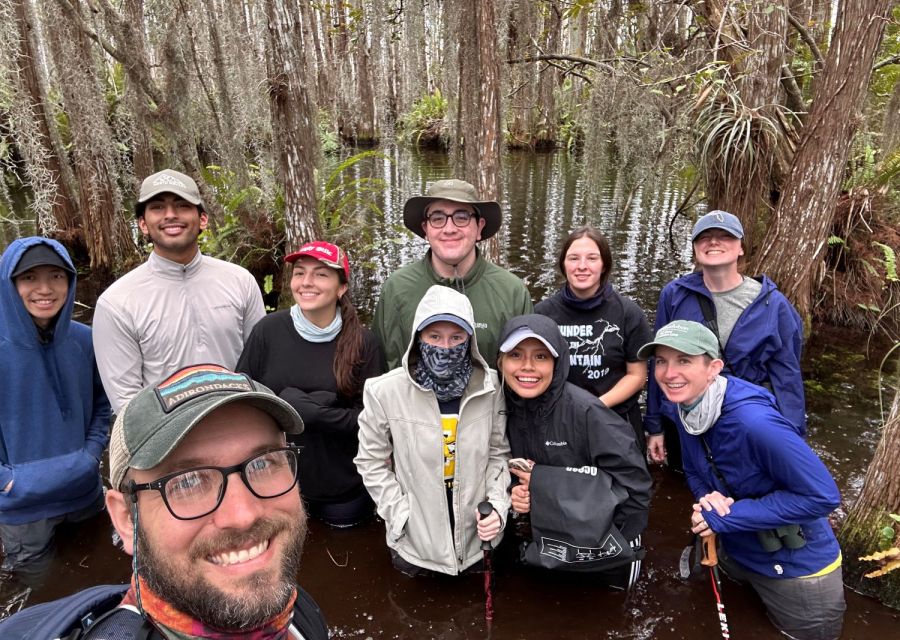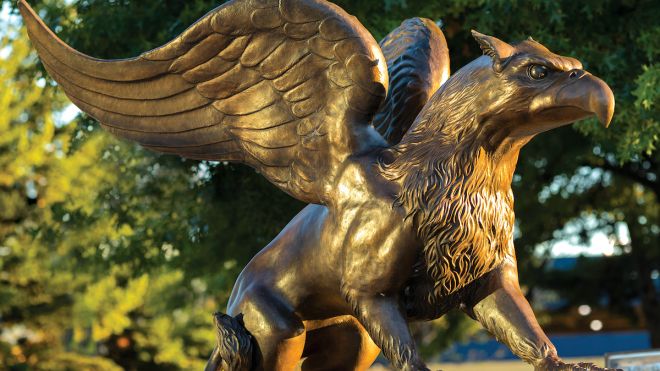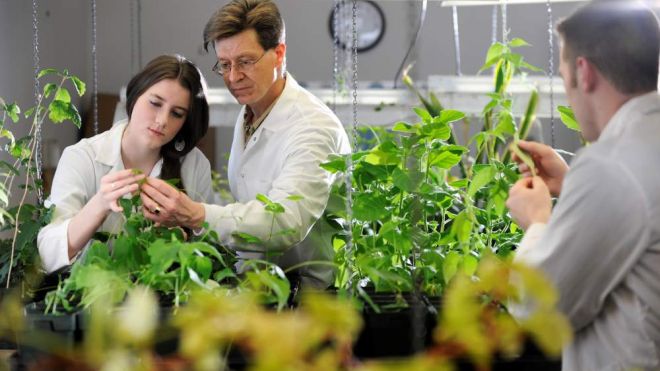
Buffalo, NY – A group of Canisius students and faculty recently returned from a week-long immersion experience in the Florida Everglades, where they came face-to-face with several endangered species. The immersion course, titled Ecology and Self, is open to students of all majors and provides them with the opportunity to explore the ecosystem of the Everglades, as well as their place in the global ecosystem.
“We tent-camped, hiked, snorkeled and explored the unique ecology of the Everglades, from sawgrass marshes to cypress domes, from dawn until way after dark,” says trip leader and Adjunct Professor of Environmental Studies Jonathan M. Roth. “Along the way, students learned about themselves and their place in caring for our common home,” adds Psychology Professor Jennifer Lodi-Smith, PhD, who co-led the trip alongside Roth.
Everglades National Park is the largest subtropical wilderness in the United States and provides important habitat for numerous rare and endangered species including the West Indian manatee, the American crocodile and the elusive Florida panther. Among the many entry points to the park, the Canisius team surveyed the costal prairie and saltwort marsh ecosystem in Flamingo; they waded through the forested wetland plant community that comprises the cypress domes; and canoed through the mangrove-lined Buttonwood Canal. Throughout these various excursions, students identified more than 230 species of plants and animals including several endangered species; most notably, the smalltooth sawfish, “which we reported to federal and international research teams,” notes Lodi-Smith.
For environmental studies major Olivia M. Coleman ’27, one of the most memorable finds was that of a Damselfly, “which was the size of a few hair strands; just barely enough to see it,” the Lackwanna resident recalls. “Each day was a new adventure and a new chance to see something that most at home had not previously seen. We learned that every living thing has its job to keep the ecosystem alive and well, and it was amazing to see the smaller parts of that system.”
“The trip made me think more critically about the environment, such as conserving resources, recycling and even where I purchase products from,” adds finance major Patrick Regan ’26. “I also developed a better understanding about the importance of the natural environment’s role in our lives, gained important team-building skills and became more comfortable with living outdoors.
The course is supported by the All-College Honors Program and the Somers Fund. The Canisius students who participated in the Everglades immersion were:
Patrick Regan ’26, finance, East Aurora; Melina E. Courtney ’26, business and integrated marketing communications, Elma; Olivia M. Coleman ’27, environmental studies, Lackawanna; Cora R. Sicley ’26, animal behavior, conservation and ecology, Mannsville, NY; Andrew Wang ’25, biology, Williamsville; Abigail S. Geist-Salone ’26, animal behavior, conservation and ecology, and biology, DuBois, PA; Nicole C. Norton ’25, psychology, Lancaster; and Yusuf J. Hashmi ’25, biology, Williamsville.
The spring 2024 semester marks the first time Canisius offered the Ecology and Self course. Roth and Lodi-Smith “look forward to continuing to support our students’ immersive learning about global ecology here in our Buffalo-Niagara region and beyond.”
“If I had to recommend the Everglades experience to another student, I would tell them to absolutely go for it,” says Andrew Wang ’25. “It was the journey of a lifetime, with places and wildlife that are so alien to Western New York. The trip developed my sense of self and independence, and the explorative nature of the class has amplified my curiosity of the natural world.”
“Any student with an interest in a travel course should take this one,” adds Cora Sicley ’26. “It was extremely fun and engaging and gave me an opportunity to do something I love while also learning how to work with others, have important discussions and think critically.”
The class was introduced to further the university’s Laudato Si’ initiative. Launched in 2021, the Vatican-led project guides Catholic institutions on ways to achieve an eco-sustainable environment within seven years. Canisius was among the first universities in the United States sign on to the Laudato Si’ platform thereby committing itself to offering ecological education, in addition to fostering ecological economics, embracing an eco-sustainable campus, developing ecological spirituality and supporting local communities in their eco-sustainable efforts.
For more information about Canisius’ immersion experience in the Everglades or to interview professors or students, contact University Communications at 716-888-2792.
Canisius was founded in 1870 in Buffalo, NY, and is one of 27 Jesuit colleges and universities in the U.S. Consistently ranked among the top institutions in the Northeast, Canisius offers undergraduate, graduate and pre-professional programs distinguished by close student-faculty collaboration, mentoring and an emphasis on ethical, purpose-driven leadership.



